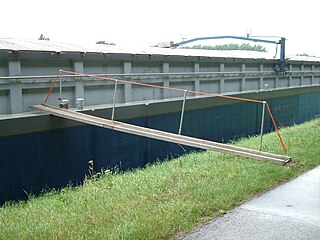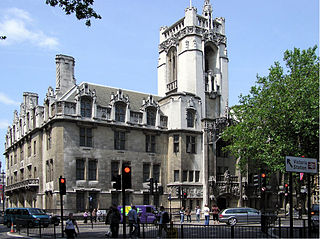In a civil proceeding or criminal prosecution under the common law or under statute, a defendant may raise a defense in an effort to avert civil liability or criminal conviction. A defense is put forward by a party to defeat a suit or action brought against the party, and may be based on legal grounds or on factual claims.

Donoghue v Stevenson [1932] AC 562 was a landmark court decision in Scots delict law and English tort law by the House of Lords. It laid the foundation of the modern law of negligence in common law jurisdictions worldwide, as well as in Scotland, establishing general principles of the duty of care.

Hedley Byrne & Co Ltd v Heller & Partners Ltd [1964] AC 465 is an English tort law case on economic loss in English tort law resulting from a negligent misstatement. Prior to the decision, the notion that a party may owe another a duty of care for statements made in reliance had been rejected, with the only remedy for such losses being in contract law. The House of Lords overruled the previous position, in recognising liability for pure economic loss not arising from a contractual relationship, applying to commercial negligence the principle of "assumption of responsibility".

English tort law concerns the compensation for harm to people's rights to health and safety, a clean environment, property, their economic interests, or their reputations. A "tort" is a wrong in civil law, rather than criminal law, that usually requires a payment of money to make up for damage that is caused. Alongside contracts and unjust enrichment, tort law is usually seen as forming one of the three main pillars of the law of obligations.

Caparo Industries PLC v Dickman[1990] UKHL 2 is a leading English tort law case on the test for a duty of care. The House of Lords, following the Court of Appeal, set out a "three-fold test". In order for a duty of care to arise in negligence:
Volenti non fit iniuria is a common law doctrine which states that if someone willingly places themselves in a position where harm might result, knowing that some degree of harm might result, they are not able to bring a claim against the other party in tort or delict. Volenti applies only to the risk which a reasonable person would consider them as having assumed by their actions; thus a boxer consents to being hit, and to the injuries that might be expected from being hit, but does not consent to his opponent striking him with an iron bar, or punching him outside the usual terms of boxing. Volenti is also known as a "voluntary assumption of risk".
Ex turpi causa non oritur actio is a legal doctrine which states that a plaintiff will be unable to pursue legal relief and damages if it arises in connection with their own tortious act. Particularly relevant in the law of contract, tort and trusts, ex turpi causa is also known as the illegality defence, since a defendant may plead that even though, for instance, he broke a contract, conducted himself negligently or broke an equitable duty, nevertheless a claimant by reason of his own illegality cannot sue. The UK Supreme Court provided a thorough reconsideration of the doctrine in 2016 in Patel v Mirza.
In the English law of negligence, the acts of the claimant may give the defendant a defence to liability, whether in whole or part, if those acts unreasonably add to the loss.
Economic loss is a term of art which refers to financial loss and damage suffered by a person which is seen only on a balance sheet and not as physical injury to person or property. There is a fundamental distinction between pure economic loss and consequential economic loss, as pure economic loss occurs independent of any physical damage to the person or property of the victim. It has also been suggested that this tort should be called "commercial loss" as injuries to person or property can be regarded as "economic".

English contract law is the body of law that regulates legally binding agreements in England and Wales. With its roots in the lex mercatoria and the activism of the judiciary during the industrial revolution, it shares a heritage with countries across the Commonwealth, from membership in the European Union, continuing membership in Unidroit, and to a lesser extent the United States. Any agreement that is enforceable in court is a contract. A contract is a voluntary obligation, contrasting to the duty to not violate others rights in tort or unjust enrichment. English law places a high value on ensuring people have truly consented to the deals that bind them in court, so long as they comply with statutory and human rights.

Hewison v Meridian Shipping Services Pte[2002] EWCA 1821 is an English tort law case, concerning an employer's liability for an employee's illegal acts.
Her Majesty's Commissioners of Customs and Excise v Barclays Bank Plc [2006] UKHL 28 is a leading English tort law case concerning negligent misstatement and pure economic loss.
Illegality in English law is a potential ground in English contract law, tort, trusts or UK company law for a court to refuse to enforce an obligation. The illegality of a transaction, either because of public policy under the common law, or because of legislation, potentially means no action directly concerning the deal will be heard by the courts. The doctrine is reminiscent of the Latin phrase "Ex turpi causa non oritur actio", meaning "no cause of action arises from a wrong". The primary problem arising when courts refuse to enforce an agreement is the extent to which an innocent party may recover any property already conveyed through the transaction. Hence, illegality raises important questions for English unjust enrichment law.
Attribution of liability to United Kingdom companies involves the rules of contract, agency, capacity, tort and crime as they relate to UK company law. They establish under what circumstances a company may be sued for the actions of its directors, employees and other agents.
Common employment was an historical defence in English tort law that said workers implicitly undertook the risks of being injured by their co-workers, with whom they were in "common employment". The US labor law terminology was the "fellow servant rule".

Hall v Hebert is a leading tort law case decided by the Supreme Court of Canada on the defences of contributory negligence and ex turpi causa non oritur actio.

Jetivia SA v Bilta (UK) Limited [2015] UKSC 23 is a UK company and insolvency law decision of the Supreme Court of the United Kingdom in relation to (i) the attribution of unlawful acts of a director to the company where the company is the victim of the unlawful act, and (ii) the extent to which liability for fraudulent trading under section 213 of the Insolvency Act 1986 has extraterritorial effect.

Patel v Mirza[2016] UKSC 42 is an English contract law case concerning the scope of the illegality principle relating to insider trading under section 52 of the Criminal Justice Act 1993. In 2020, the Supreme Court described this case as having set out a "a significant development in the law relating to illegality at common law".

Deloitte & Touche v Livent Inc , 2017 SCC 63 is a leading case of the Supreme Court of Canada concerning the duty of care that auditors have toward their clients during the course of a professional engagement.

Singularis Holdings Limited v Daiwa Capital Markets Europe Limited[2019] UKSC 50 is a judicial decision of Supreme Court of the United Kingdom relating to the duties owed by a bank where a person acting on behalf of a corporate customer of the bank directs the bank to transfer money out of the company's account as part of a fraudulent scheme.








